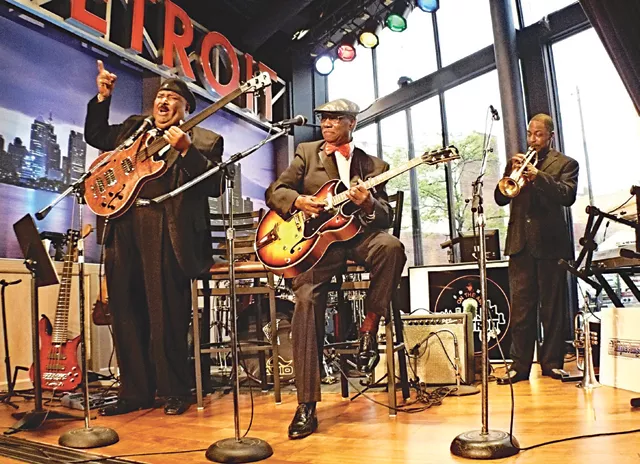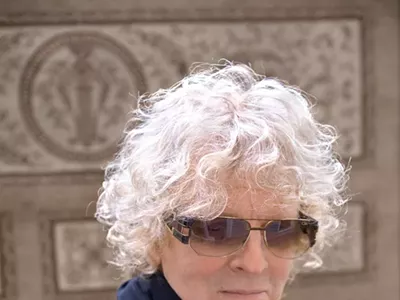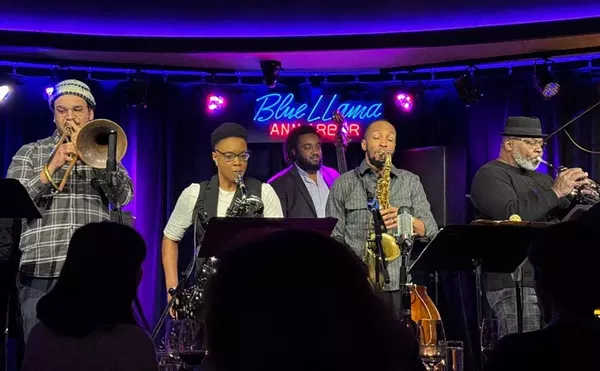It isn't uncommon for Detroit musicians to refer to their hometown in reverential terms. In fact, it's practically compulsory. Anything else and one will likely fall victim to the kind of backlash that Jack White received. Still, Ralphe Armstrong stands out from the crowd when feverishly talking about his love for the D.
The imposing bass player now hosts what's predictably called The Ralphe Armstrong Show, on UDetroit, webcasting live and on-demand from the downtown club of the same name. He big ups his new adventure with a fervor way beyond self-promotion.
"My show is about what's positive in the city of Detroit," Armstrong says. "Detroit's been taking such a knock, and I decided to stay home and do something about what's positive here, with all of the great musicians who come out of Detroit. Just recently, I had Greg Phillinganes on the show from Michael Jackson's band. The great Johnnie Bassett, who won the W.C. Handy award. I've had so many people. Not just music, it's about what's positive. It's like a talk show, and we feature all of the great people who come out of Detroit."
Believe me, that's not the last you'll be hearing about his show; he manages to shoehorn the subject into the conversation a lot. Thing is, he does it with pure passion. And let's be fair — Armstrong is, if not the local legend he deserves to be, certainly a Detroit treasure. He played with the Mahavishnu Orchestra and Frank — fucking — Zappa. Jean-Luc Ponty, Aretha and Miles too, among many others.
With names like that on your résumé, it's fair to say that you can play, and Armstrong can play the shit out of his bass. His genes are certainly good — his late, great father, Howard (Louie Bluie) Armstrong, who was named a national treasure by the National Endowment for the Arts. The elder Armstrong recorded starting in the 1920s with such country blues legends as Memphis Minnie and Sleepy John Estes. He saw a career revival in the '70s with the trio Martin, Bogan and Armstrong, and was the star of Louie Bluie, Terry Zwigoff's documentary about the group. Armstrong helped inspire the string-band revivalists in the Carolina Chocolate Drops — whose name riffs on his Tennessee Chocolate Drops from the 1930s — and he's honored in Caryville, Tenn., near where he grew up, with the Annual Louie Bluie Music and Arts Festival.
Raphe recalls his father telling countless stories. "Tons of stories," he says. And Ralphe can share some memories too, but then he has the material. He did work with Zappa.
"I was with John McLaughlin and Zappa used to have us open for him," Armstrong says. "We traveled and then when [McLaughlin's] Mahavishnu broke up, Zappa said that he wanted me to play in his band. I said, cool. We were hanging out after the gigs and he just picked me up, got me in his group in New York. He was extremely organized. He was a disciplinarian. He did no drugs, and he didn't abuse himself. He didn't believe in anybody smoking pot in his band. He'd fire you. He taught me a lot about the stage: how to do certain things that people like, how to dress a certain way. He was a very intellectual guy, and also a good businessman. He was a great guy. He let me have my freedom. He let me play. It was like being in the army though — he kept me on salary for about a year. Back in '76, this was. Zappa was a classical rock musician, blues-oriented too. He played the guitar like Howlin' Wolf on steroids, to me. If you listen to the two, they're very similar in concept. He had the best penmanship out of any artist I ever worked with."
Ask Armstrong about his favorite experiences from his long and successful career, and he'll bring it back to the D. Musicians from all over the world, he says, love Detroit. "When I played with Santana, a Cuban percussionist called Armando Peraza, I believe, played in the original Santana band," he says. "He came up to me and said, 'You're from Detroit?' He started telling me all about my city. How he moved here in 1950 and he played all about Paradise Valley. After it dried up, he moved to the West Coast. But this is the first city he came to. We had a big Afro-Cuban thing. A lot of people don't realize that. A lot of the Motown musicians got a little bit of that sound in their music."
We get it, sir. You love it here. Still, Armstrong admits that the music business has changed before his eyes. "There are not as many places to play," he says. "A lot of the clubs and establishments have dried up, but I see it coming back. I love Bert's [Bert's Marketplace in Eastern Market]. I've known Bert since I was 13. I play there because I have fun, and he's like a family member. I like doing that. We just do a jam session. When I'm home, it gives me something to do. When cats come off the road, they've got to play somewhere. Detroiters are blessed because they get all of this great talent for little or nothing. As for new venues, I like Cliff Bell's, but the best jazz club in the world is the Dirty Dog. It's at least one of the top. They treat the musicians exquisitely. They have modern facilities and the dressing rooms are some of the nicest on the planet. It's just a great place. I think I'm there New Year's Eve."
All joking aside, it's refreshing to hear a veteran musician, someone with a real pedigree, talk so adoringly about Detroit without dwelling on "it was better in my day." Armstrong is an optimist, and with good reason. There is a ton of new talent coming out of Detroit, playing all styles of music. It is, he says, a true resurgence. "You can tell by looking out the window right now," Armstrong says. "The city is being built up with the downtown area. The thing is, even a lot of Detroiters don't know about the great people who have come out of Detroit. Like Regina Carter and James Carter, Byron Miller, Ron Carter — the greatest bass player that ever lived. I could go on and on. There's a rich history. Kenny Burrell, Earl Klugh. There's a multitude. It's been a smorgasbord of all the great people we have here in Detroit. Also, some of the people who I know in the music business are gonna come back. Everyone I know loves Detroit. I also interviewed Freda Payne, who's from Detroit."
So now he's doing his weekly live sets and TV show and telling as many people as he can get to tune in how awesome Detroit is. He talks passionately about new musicians he's working with like Ashaki Zeigler, and the role his producer, Al Fields, plays in making the show work. He's not trying to hog any limelight. Armstrong just wants to make Detroit better.
"I've been in the entertainment business for a long time," he says "Frank Zappa was preparing us years ago to do a TV show for NBC which never came through. I also do a lot of comedy. I learned from Zappa how to entertain people. I hope I keep doing that. This is keeping me here in Detroit. I've been working with the Funk Brothers. Last year I was with Sting. But I want to concentrate on this show. I live downtown and I can walk to the studio. This is some cosmopolitan stuff here, like being in New York. Honestly, we're gonna bring this music business back. Give the young kids some place to go like I had when I was a kid. Detroit produces, I would say, 50 percent of the world's great musicians."
Can I get a "Hell, yeah"?
Ralphe Armstrong hosts a tribute show for his dad, Howard Armstrong, Oct. 28, with Ortheia Barnes, Ray Kamalay and Jeff Reynolds at the UDetroit Café; 1427 Randolph St., Detroit; 313-962-0660; seating starts at 6:30 p.m.; webcasting on UDetroit.com. Armstrong can also be heard 8:30 p.m. to 12:30 a.m. Thursdays as part of the RGB Trio, anchoring jam session at Bert's Marketplace, 2727 Russell St., Detroit; 313-567-2030.







